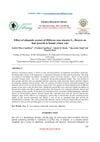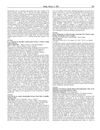 32 citations,
December 2013 in “Biological & Pharmaceutical Bulletin”
32 citations,
December 2013 in “Biological & Pharmaceutical Bulletin” Rice bran extract can potentially treat hair loss by promoting hair growth and increasing the number of hair follicles.
 14 citations,
April 2006 in “Expert Review of Dermatology”
14 citations,
April 2006 in “Expert Review of Dermatology” Antiandrogen therapy helps treat genetic hair loss.
 7 citations,
February 2013 in “Tropical Journal of Pharmaceutical Research”
7 citations,
February 2013 in “Tropical Journal of Pharmaceutical Research” Licorice root extract may promote hair growth in female rats.
 4 citations,
September 2020 in “Frontiers in Microbiology”
4 citations,
September 2020 in “Frontiers in Microbiology” Algal oligosaccharides help prevent hair loss and promote hair growth.
 4 citations,
January 2011 in “Der Pharmacia Lettre”
4 citations,
January 2011 in “Der Pharmacia Lettre” Hibiscus flower extract slowed down hair growth in rats.
 121 citations,
May 2009 in “Journal of Ethnopharmacology”
121 citations,
May 2009 in “Journal of Ethnopharmacology” Eclipta alba extract may help hair grow similarly to Minoxidil.
 99 citations,
June 1999 in “The Journal of Clinical Endocrinology and Metabolism”
99 citations,
June 1999 in “The Journal of Clinical Endocrinology and Metabolism” Testosterone replacement may help some postmenopausal women with symptoms like fatigue and low libido, but more research is needed to fully understand its effects.
 42 citations,
November 2019 in “Frontiers in Endocrinology”
42 citations,
November 2019 in “Frontiers in Endocrinology” The document suggests creating a validated score to diagnose Cushing's Syndrome and considers plasma steroid profiling as a simpler diagnostic method.
 17 citations,
August 2019 in “Archives of Cardiovascular Diseases”
17 citations,
August 2019 in “Archives of Cardiovascular Diseases” Low testosterone in men is a risk factor for a specific heart rhythm issue, and testosterone treatment may help prevent it.
 13 citations,
March 2019 in “Journal of Dermatological Treatment”
13 citations,
March 2019 in “Journal of Dermatological Treatment” Finasteride can treat hair loss, but may have side effects; evaluate and inform patients of risks.
 5 citations,
January 2016 in “Asian pacific Journal of Tropical Biomedicine”
5 citations,
January 2016 in “Asian pacific Journal of Tropical Biomedicine” Phthirusa pyrifolia extract may lower testosterone and harm male rat reproduction without damaging the liver or kidneys.
 May 2024 in “Deleted Journal”
May 2024 in “Deleted Journal” Dutasteride effectively treats hair loss in men who don't respond to finasteride.
 February 2020 in “Biophysical journal”
February 2020 in “Biophysical journal” Zebrafish with mutations similar to human Cantú Syndrome have heart cells with altered channel properties, making them a good model to study the condition.
 May 2023 in “Bali Medical Journal”
May 2023 in “Bali Medical Journal” Higher sebum levels are linked to more severe male baldness.
10 citations,
February 2021 in “International Journal of Nanomedicine” Chitosan-decorated finasteride nanosystems improve skin retention and could be a better treatment for hair loss.
12 citations,
August 2022 in “Ecotoxicology and Environmental Safety” A new method accurately detects bisphenols and parabens in human hair.
2 citations,
January 2016 in “Advanced biomedical research” The hair wax with propolis and Eruca sativa seed oil promotes hair growth effectively.
February 2025 in “International Journal of Impotence Research”  January 2024 in “JOJ Dermatology & Cosmetics”
January 2024 in “JOJ Dermatology & Cosmetics” TH07 treatment is promising for hair growth, with higher satisfaction in males.
January 2023 in “Applied sciences” Equisetum debile extracts may help with skin whitening, anti-wrinkle, and anti-hair loss treatments.
30 citations,
January 2019 in “International Journal of Trichology” Androgenetic alopecia significantly harms quality of life, affecting emotions and relationships.
21 citations,
November 2017 in “Cochrane library” Ovarian drilling surgery is not clearly better than medical treatments for PCOS symptoms.
 3 citations,
December 2022 in “npj Regenerative Medicine”
3 citations,
December 2022 in “npj Regenerative Medicine” HSPGs help control stem cell behavior, affecting hair growth and offering a target for hair loss treatments.
 June 2023 in “Brazilian Journal of Health Review”
June 2023 in “Brazilian Journal of Health Review” Hair transplantation improves life quality and self-esteem in men with male pattern baldness.
November 2013 in “Journal of clinical & experimental dermatology research” The follicular unit extraction method for hair transplants is a technique with benefits and drawbacks.
 2 citations,
September 2007 in “International Journal of Impotence Research”
2 citations,
September 2007 in “International Journal of Impotence Research” Local testosterone treatment improved sexual desire in a female with fragile X syndrome.
 30 citations,
April 2021 in “The Journal of Sexual Medicine”
30 citations,
April 2021 in “The Journal of Sexual Medicine” Testosterone therapy can help postmenopausal women with low sexual desire if monitored carefully.
 20 citations,
April 2021 in “Journal of Womens Health”
20 citations,
April 2021 in “Journal of Womens Health” Testosterone can help premenopausal and postmenopausal women with low sexual desire, but its long-term safety is unclear and it's not widely approved for this use.
 11 citations,
July 2019 in “The Journal of Sexual Medicine”
11 citations,
July 2019 in “The Journal of Sexual Medicine” Spironolactone might cause painful intercourse and decreased sexual arousal in women.
 7 citations,
April 2012 in “Clinical investigation”
7 citations,
April 2012 in “Clinical investigation” Transdermal testosterone can improve sexual desire in postmenopausal women but lacks long-term safety data and is not FDA-approved for this use.






















